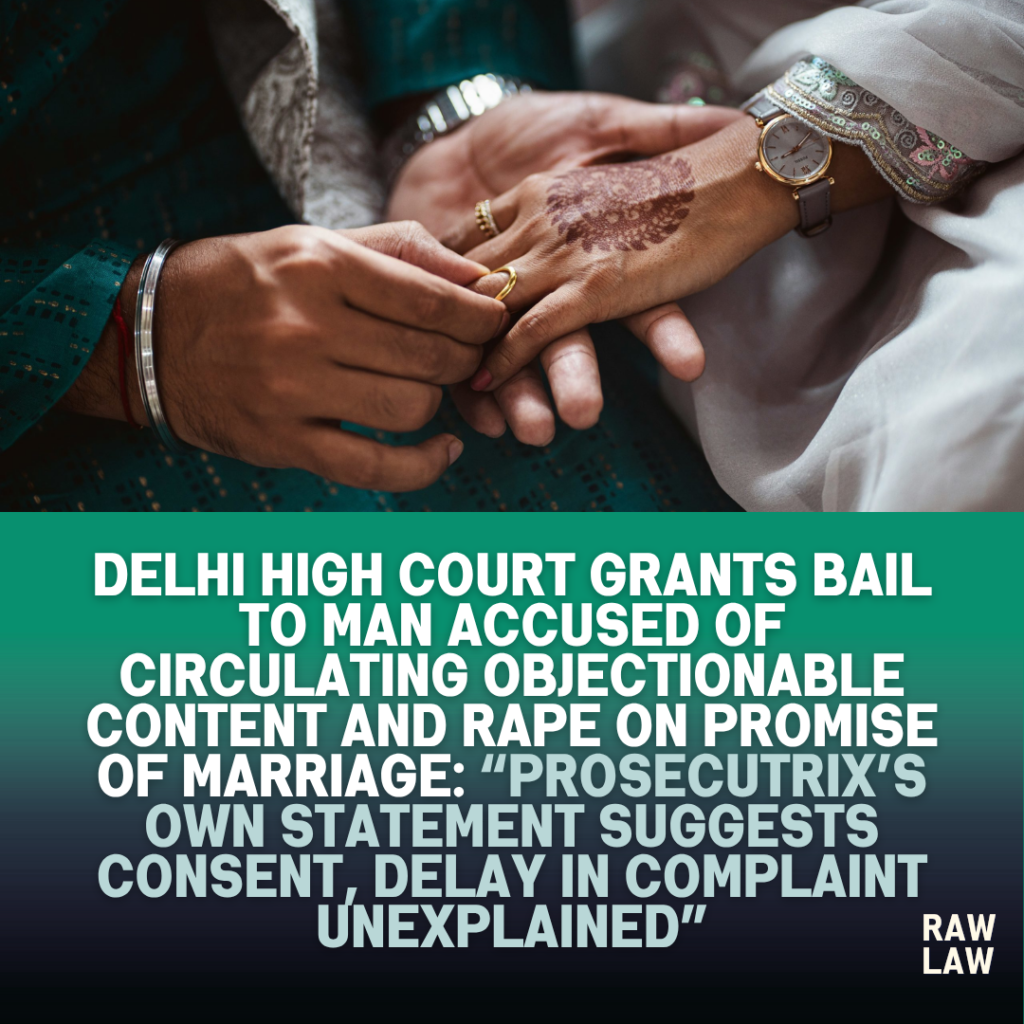Court’s Decision
The Delhi High Court granted bail to the accused, observing that the prosecutrix’s allegations of rape on the pretext of marriage and circulation of objectionable photos were unsupported by evidence and belied by her own conduct. Justice Girish Kathpalia noted:
“The overall circumstances prima facie reflect it to be a case of consensual relations; and there is nothing on record to substantiate the allegation of the prosecutrix about her objectionable photographs having been clicked and/or morphed and/or circulated.”
The Court held that an individual should not be deprived of liberty in the absence of credible material and directed release on bail subject to conditions.
Facts
The accused was arrested in connection with FIR No. 973/2024 registered at Police Station Mehrauli for offences under Sections 64, 69, and 351 of the Bharatiya Nyaya Sanhita. The prosecutrix, aged about 26, alleged that she developed an intimate relationship with the accused after being promised marriage. She claimed she moved into his residence, where they stayed together for two months.
She alleged that on 27 November 2024, after their breakup, the accused coerced her into accompanying him, raped her, took explicit photographs, and later circulated them—particularly to a prospective groom—which led to the cancellation of her matrimonial alliance. The FIR was registered based on her statement dated 21 December 2024.
Issues
- Whether the relationship between the prosecutrix and the accused was consensual.
- Whether the allegations of forced sexual relations and distribution of objectionable photographs were supported by any evidence.
- Whether the delay in lodging the FIR impacted the credibility of the prosecution’s case.
Petitioner’s Arguments
Counsel for the petitioner argued that the allegations were false and that the relationship was entirely consensual. The prosecutrix had voluntarily entered into a romantic and live-in relationship and left only when she chose to end it. It was submitted that the allegations regarding the circulation of photos were fabricated and were only made to ensure the accused remained in jail. The petitioner’s counsel pointed out that the FIR was lodged only after more than a month of the alleged incident and that there was no evidence recovered to support the claim that objectionable material had been shared.
Respondent’s Arguments
The State opposed the bail but conceded that the investigation was inefficient and yielded no substantial evidence to prove the allegations. The prosecutrix, through her counsel, reiterated the charges that the accused had coerced her into sexual relations under a false promise of marriage and had sent intimate content to her potential groom, resulting in a broken alliance. However, the IO confirmed that no objectionable photographs or videos were found on the accused’s phone or that of the prospective groom.
Analysis of the Law
The Court examined the principles relating to consent under criminal law, particularly in the context of alleged rape on the pretext of marriage. It noted that consent obtained through deception may be considered vitiated under ordinary circumstances. However, the Court distinguished this case, noting that the prosecutrix had continued in a live-in relationship for two months, with repeated instances of consensual intercourse.
It was held that:
- The prosecutrix’s own statement showed she had consensual relations with the accused.
- Her decision to leave the relationship undermined the claim that her consent was vitiated.
- There was significant delay in filing the FIR without any explanation.
- No objectionable content was found by the investigating officer, despite allegations to that effect.
Precedent Analysis
The Court did not cite external judgments but relied on well-established principles of criminal jurisprudence: that allegations of rape based on false promises of marriage must be scrutinized against the conduct of the prosecutrix and the surrounding circumstances.
The Court emphasized that in the absence of credible corroborative material, custodial detention would be unjustified, particularly when the FIR was delayed, the relationship was consensual, and the alleged content was not found.
Court’s Reasoning
Justice Kathpalia carefully analyzed the sequence of events and the prosecutrix’s own admissions. The Court reasoned that:
- A grown adult woman who lived with the accused for two months and continued having sexual relations could not claim to be misled throughout, especially when she herself ended the relationship.
- The month-long delay in approaching the authorities weakened the claim of coercion or deception.
- No photographs or videos—let alone nude or morphed ones—were discovered.
- The IO’s statement clarified that neither the accused’s phone nor the groom’s phone had any objectionable content.
Thus, continued incarceration was deemed unwarranted in the absence of prima facie material.
Conclusion
The Court allowed the bail application and directed that the accused be released on bail upon furnishing a personal bond of ₹10,000 with a like surety. It also imposed a condition restraining him from contacting the prosecutrix or prosecution witnesses. The Court clarified that its observations were limited to the bail context and should not influence the trial.
Implications
This judgment reinforces judicial caution against routine denial of bail in relationship-based criminal allegations where consent and conduct of parties are crucial. The ruling reiterates that live-in relationships, especially among consenting adults, must be carefully examined before criminalizing them as rape under the guise of false promises.
It also underscores the importance of timely reporting and the need for corroborative evidence in digital content allegations—especially where reputational damage is claimed.
FAQs
1. Can consensual sexual relations in a live-in relationship amount to rape if the promise of marriage is withdrawn?
Not always. If the woman voluntarily continues the relationship and later chooses to end it, her retrospective claim that she was misled is subject to strict judicial scrutiny.
2. What happens if no objectionable photographs are found in such a case?
Allegations of photo or video circulation must be backed by forensic or digital evidence. Mere claims without recovery or confirmation cannot justify denial of bail.
3. Is delay in filing a rape complaint significant?
Yes. Unexplained delay, especially in adult consensual relationships, can weaken the prosecution’s case and is a critical factor in bail decisions.



